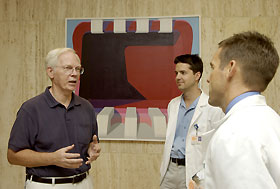For more archives, go to the Advance Archive/Search Page.
Anatomy Instructor Wins Health Center Teaching Award
Dale Matheson strives to teach as he would like to be taught.
 |
Dale Matheson, left, an anatomy instructor and recipient of the 2004 Loeser Teaching Award, speaks with dental students Eric Geigle and Brian Shaughnessy.
|
The results so impressed medical and dental students that they voted Matheson, a clinical instructor of anatomy at the Health Center, basic sciences teacher of the year.
Matheson, who teaches Human Biology, and Organ Systems I, II and III, has been named recipient of the 2004 Charles N. Loeser Award for Excellence in Teaching in the Basic Medical Sciences.
The award, named in memory of anatomy professor Dr. Charles Loeser, is presented annually to a Health Center faculty member by second-year medical and dental students. Matheson is the first part-time faculty member to win the Loeser Award.
Criteria for the award are: scholarly curiosity; the ability to evoke in students an enthusiasm for learning; and a desire to give wholeheartedly to advance the welfare and education of students.
"Dale Matheson has a passion for gross anatomy, and spends countless hours in class and out of class assisting the medical and dental students learning this material," says Dr. Bruce Koeppen, medical school dean for academic affairs and education.
Matheson says anatomy offers some teaching advantages and some challenges as well.
He says the topic is best taught in small groups of about four students forming a cluster around one cadaver. Advantages of the small groups to
the teacher include personalized instruction, closer acquaintance with the students, and an enhanced understanding of how they're doing and how much they understand.
"The advantage of small groups is that it allows you to modify your approach," Matheson says. "You can tell what information they have and then you can build on it.
"I try to do this in a non-intimidating way," he adds. "You create a mutual environment of trust and the students will feel free to take some risks in responding. You use that to help them. If they're right, that's good; if they're not right, you help them find the right answer."
Matheson says challenges of teaching anatomy include the enormous amount of things to know; specialized vocabulary and the need to apply it appropriately; and the technical capabilities required for dissection.
"Lots of students run into problems in anatomy," Matheson says. "They're overwhelmed. You can't just identify a muscle, you have to know all about it. When you find a muscle, is it the one you want? If so, why? If the ends of the muscle are attached to the bone, you have to show the attachments. You have to know the nerves that enervate the muscle and the blood vessels that nourish it."
He says the teaching staff can help by dividing the material into "manageable nibbles."
Matheson brings a lifetime's reflection to teaching. After taking a degree in anatomy at the University of Pennsylvania, he taught at Hershey Medical Center for several years. He left the medical school for industry, where he practiced for 25 years and ended up in Connecticut. When the Health Center was looking for anatomy teachers a number of years ago, he applied.
"When I returned to teaching I had the big picture but I had forgotten lots of details," he says. "Anatomy is right or wrong; it's a structure or not. I had the luxury of refreshing myself and exploring the information. It helped me identify sticking points.
"Things that were unclear from textbooks, I worked hard to understand," he adds. "As a result I can explain better. I can sympathize with the students. We'll work something out together. I'm not afraid to do that."
Kirsten Ek, now a third-year medical student, who voted for Matheson, says he is excellent at explaining. "He'll spend as much time as you need and you never get the short answer," she says. "You always get a well thought-out response."
Matheson says he enjoys contact with students: "I enjoy helping them come to grips with information they do not understand, shining light on information they have but cannot put into context."
Ek says Matheson learns all the students' names the first year. "He makes you feel like you're welcome here from the get-go," she says. "He looks at the students as people, and it just gets into your heart."

